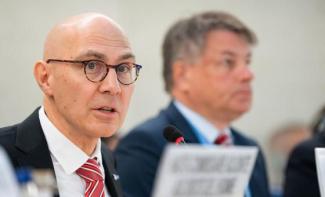
Madrid (Spain), October 5, 2023 (SPS) - The United Nations High Commissioner for Human Rights, Mr. Volker Türk, indicated yesterday the existence of the right to self-determination when addressing the Sahrawi issue, calling for placing human rights at the heart of the settlement process.
In an interview with “Europa Press” during his visit to Madrid to participate in the seventy-fifth anniversary of the Declaration of Human Rights, Türk stressed that “the right to self-determination forms part of human rights,” stressing in this regard that “ human rights standards must be applied to people living in the territory (Western Sahara), but also outside it, those who are in refugee camps.
The UN official expressed his hope that there would be a solution for the Sahrawi people, noting that “human rights in terms of reconciliation, confidence-building and justice will lead to a solution, which must be achieved through a political process.”
Türk stressed the need for a political process and negotiations to address the conflict, noting in this context that there are very clear decisions of the Security Council and the United Nations General Assembly regarding the issue of Western Sahara.
At the end of his speech to “Europa Press”, Volker Türk concluded that this does not fall within the framework of the duties of the High Commissioner for Human Rights, expressing some satisfaction with the recent visit made by Staffan de Mistura, the UN Secretary-General Special Envoy for Western Sahara, to the occupied territories of Western Sahara.
It is noteworthy that the High Commissioner for Human Rights, in his report to the 52nd session of the Human Rights Council, stressed the importance of his office being able to visit Western Sahara by resuming technical visits that have been suspended for eight years due to the obstacles placed by the Moroccan occupation on international bodies and the military siege of the Occupied Western Sahara.
SPS 110/T